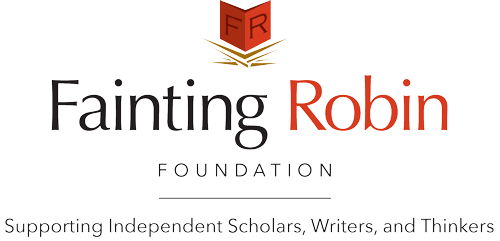Quanesha Mullins
2024 Fainting Robin Distinguished Scholar
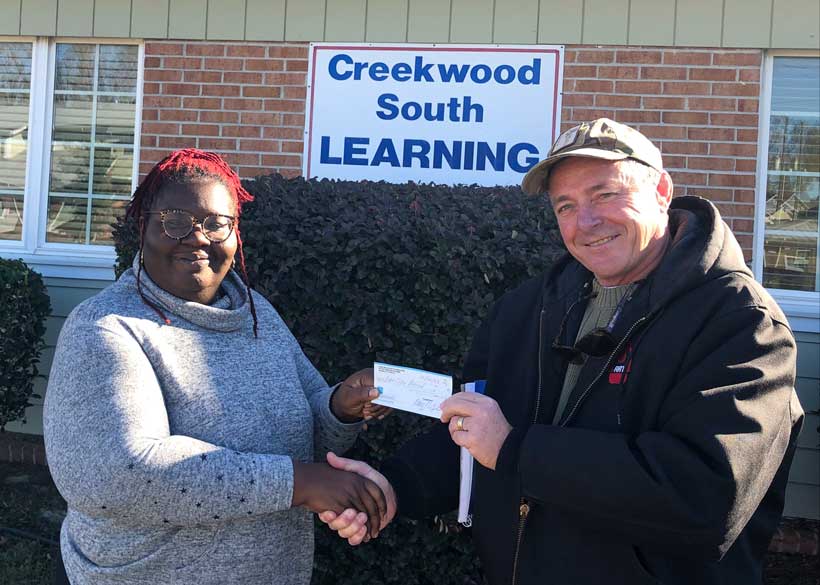
Quanesha Mullins with Peter Maguire
Although the population of Wilmington, North Carolina, grew by 52%
between 2002-2020, the crime rate during that period dropped by
54%. Police chief Donny Williams attributes the reduction in crime
to the collaboration between his officers "and non-profit
organizations, faith-based communities, and the citizens of
Wilmington." Quanesha Mullins, the founder and executive
director of the Wilmington-based nonprofit Port City Period Youth
Empowerment, has been an important agent of change during this
period.
Mullins has devoted her life to providing education, training, and
opportunities to the residents of Creekwood, a Wilmington Housing
Authority public housing development where the residents’ average
income is less than $20,000 per year. More than twenty years ago,
Mullins moved from New York to Wilmington, and settled in
Creekwood. On her first night in her new home, she watched a man
attack a police car. "We left New York, the heart of New
York, the Bronx at that, to move in Creekwood," she recalled.
"And it’s the same behavior."
Initially, Quanesha Mullins spent as little time in Creekwood as
possible. Then one day, a neighbor asked her, "If you don’t
like it, what are you doing to make a change?" That question
hit home and the mother of two young boys began to do small things
to improve the lives of those around her. After the Creekwood
community acquired a van, Mullins organized trips for her sons and
their friends. She regularly packed seventeen boys into that van
and drove them to games and other events in and around Wilmington.
Snacks, permission slips, logistics—Mullins did it all because she
wanted her sons and the kids they grew up with to be "safe
and successful."
One of Quanesha Mullins’ first big victories came when she got the
Cape Fear Public Transportation Authority to provide a bus stop
for Creekwood’s students. After successfully petitioning for this,
she realized that "any small victory counts." Instead of
expecting outsiders to improve her community, she needed to make
the changes herself. "People want to bring programs out here,
but they don’t want to talk to the residents," she said,
"and actually see what we need, not what they think we
need."
What Creekwood needs today, according to Mullins, are more of the
types of after-school classes, youth activities, and vocational
programs that her nonprofit, Port City Period, provides for
children and at-risk teens. The hope of a brighter future is what
she believes will help Creekwood’s youth break the cycle of gangs,
drugs, prison, and government dependence. To her these are not
abstract or academic issues, they are deeply personal. Of the
seventeen boys she once drove in the Creekwood van, today only two
are not in prison or dead. This grim statistic includes her own
son who will spend the next twenty years behind bars.
"If you just give up because of one incident or trouble, you
might as well just stop everything," said Mullins. "You
have to keep going, you just can’t give up because there is
trouble everywhere. People need to take a chance on Creekwood,
take a chance on the residents because there is a lot of great
people out here." In addition to the cash award, Fainting
Robin Foundation director Peter Maguire will also teach an
afterschool writing class and provide college counseling to
students at the Creekwood South Learning Center in 2024. FRF will
also teaching skateboarding in Creekwood, and former pro
skateboarder/owner of Eastern Skate Supply, Reggie Barnes, has
generously agreed to provide the skateboards and protective
equipment.
Wilhelmina Yazzie
2023 Fainting Robin Distinguished Scholar
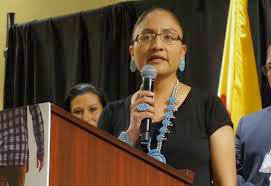
Wilhelmina Yazzie
The state of New Mexico holds the unwelcome distinction of ranking
last in the United States in both K-12 education and overall child
well-being. "My late mother, an educator for 30 years, taught
me to do what I could for all of the children in our community,
not just my own," wrote Wilhelmina Yazzie, one of the
plaintiffs in the landmark education lawsuit,
Yazzie/Martinez v. State of New Mexico and Fainting Robin
Foundation’s 2023 Distinguished Scholar.
New Mexico’s underfunded, understaffed Gallup/McKinley school
district sits on the edge of the Navajo Nation, where 30% of the
households live below the poverty line, without electricity or
running water, much less computers or online access. The schools
in this district lack textbooks, qualified teachers, counselors,
AP classes, computers, after school programs, and social workers.
When Yazzie’s son Xavier, an ambitious straight-A student in that
district, did not score at grade level on a standardized national
achievement exam, she asked his school for a tutor to help bring
up his scores and was told that there were none.
When Wilhelmina Yazzie began to speak to other parents, she
realized that other students were in far worse shape than her
three children, who had laptop computers and broadband. "The
struggles they encountered and the limited access: not enough
books, limited computers, even teachers asking students to help
bring classroom materials," wrote Yazzie. "We’d have
substitute teachers for half or the whole year! Limited
programming and social services are nonexistent in some
schools."
Yazzie worried that her three children, despite their best
efforts, were being left behind by a broken, top-heavy educational
system and remembered the words of her Navajo grandmother and
mother. They taught her that "children are sacred and it’s
our responsibility to prepare them for ‘iina,’ what we call ‘life’
in Navajo." Inspired by her mother who raised four college
graduates on a schoolteacher’s salary, Yazzie, a paralegal,
spearheaded a lawsuit against the state of New Mexico and its
governor.
In March 2014, she and others filed
Yazzie et al v. New Mexico. The plaintiffs argued,
"The state of New Mexico is failing its public school
students and has failed them for so long that there now exists an
entire generation of children in this state who do not possess the
basic capabilities to meaningfully function in modern
society." On July 20, 2018, First Judicial District Judge
Sarah Singleton handed down a withering decision that declared New
Mexico’s public education system a "dismal failure" that
violated students’ constitutional right to a sufficient education.
"When I heard the news that we won, I really couldn’t believe
it,” she said. “I looked up, and I said, ‘Mom, you know what? We
did it.’"
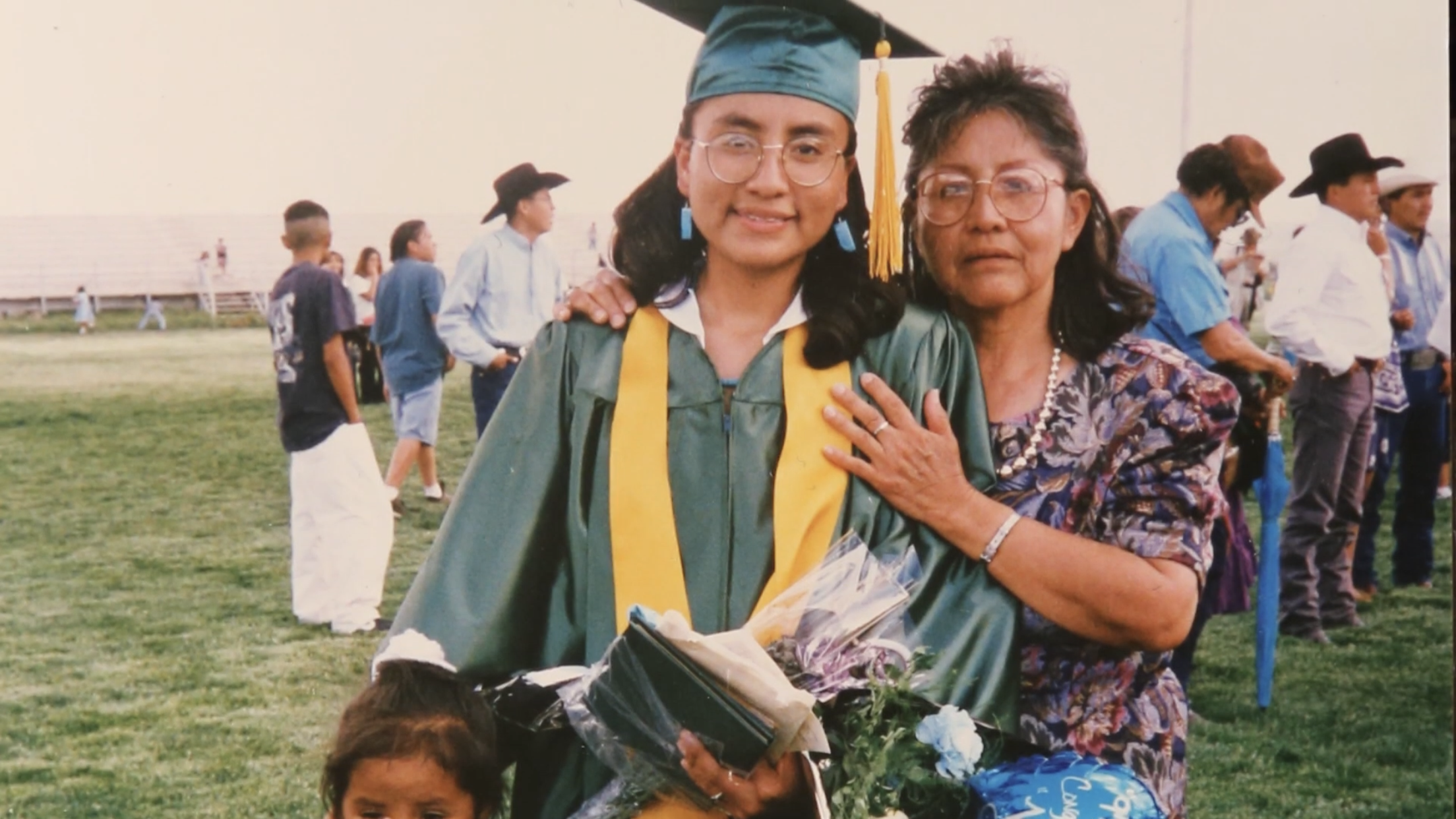
Wilhelmina Yazzie at graduation with her mother.
Today, Wilhelmina Yazzie continues to advocate for the rights of
all of New Mexico’s students. After four years of waiting, the
state’s Public Education Department finally released a draft of
their plan to improve education in that state. "We’re such a
diverse state, we’re such a beautiful state, we have such
beautiful cultures and backgrounds," said Yazzie. "We
could actually climb back up to the top, if we really work
together."
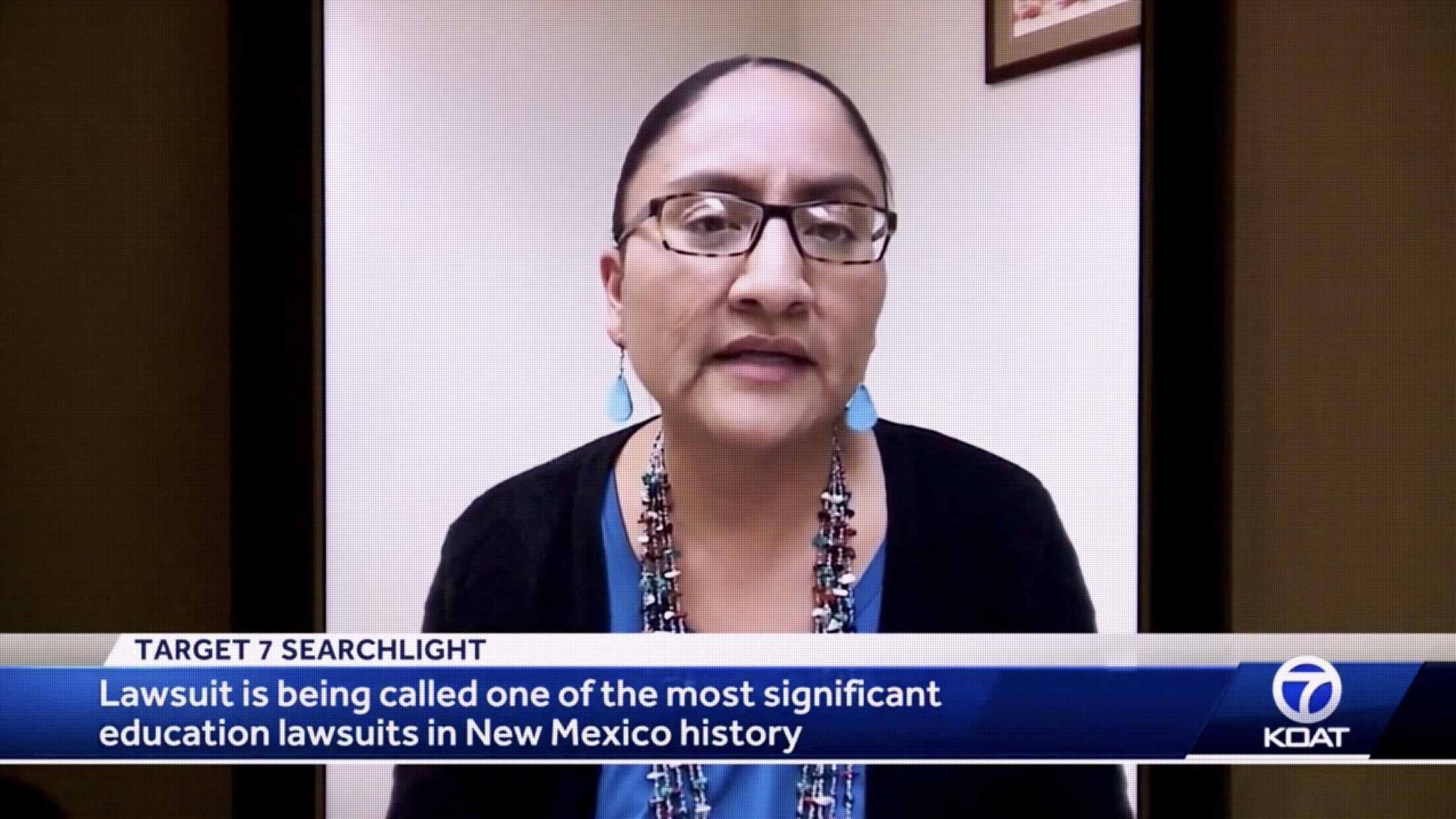
Wilhelmina Yazzie is interviewed by a local TV news channel
about her landmark lawsuit.
T. Robert Hart
2022 Fainting Robin Distinguished Scholar
There is a great deal of talk today on college and university
campuses about "social justice" and "equity."
It is time these concepts are expanded to include the growing
academic underclass that does much of the heavy lifting when it
comes to teaching undergraduates. Fainting Robin Foundation’s 2022
Distinguished Scholar award goes to Dr. T. Robert Hart, one of the
million plus college and university professors who work outside of
the tenure-track system. A dedicated teacher and scholar, Hart has
taught history at University of North Carolina Wilmington as a
"lecturer" for more than a decade. Although
"lecturers" and adjunct professors like him teach the
same classes, advise the same students, and grade the same exams
as their tenured colleagues, they are paid a fraction of their
wages.
Since the fall of 2020, Hart has taught 17 classes on everything
from environmental history, Appalachian history, U.S. National
Parks, and Coastal History, directed two honor theses, served on
two graduate honors thesis committees, participated in ten
professional development workshops and served as his department’s
liason for Distance Learning during the pandemic. Below are some
of the student evaluations from Hart’s Environmental History class
last semester.
Dr. Hart is probably the best teacher I’ve had at UNCW. He is a
very understanding, kind guy and is willing to work with his
students on any problem they may have with the course….Dr. Hart
is one of the few professors I’ve had at UNCW that I never saw
make a student look dumb for asking a "stupid"
question. This was one of those classes where the lectures were
typically interesting and I left feeling like I had learned
something. My only complaint is that the class time probably
should have been longer by about 30 minutes or so for the amount
of content covered, but obviously, that is not the fault of Dr.
Hart. Fantastic teacher, can’t wait to have another class of
his.
Dr Hart is an exceptional teacher. His presentation style and
willingness to encourage class discussions makes his class very
insightful and interesting.
Truly one of the professors that I will remember from my time
here, Professor Hart has stood out as one of the best. He is
passionate about what he teaches and it translates to the
classroom. He is very friendly and personable and makes the
material easy to understand. It is clear he is very passionate
about this and only wants us to see in nature what he sees.
Professor hart and this class have been one of the best
experiences I have had at UNCW.
Dr. Hart is truly an amazing professor, one of the best
professors I have had so far at UNCW! He is concise, makes
learning interesting, his stories and the way he lectures in
class is captivating, and you can actually tell he cares about
Environmental History and what students are learning and taking
away from his class. He is amazing at answering questions and
responding to emails in a timely manner which I find extremely
rare with other encounters regarding other professors at UNCW.
He makes his schedule flexible if you have any questions or
would like to discuss class materials. 100/10!
Despite his massive teaching load, T. Robert Hart still found the
time and energy for scholarship. He contributed a chapter in the
book
American Discord: The Republic and Its People in the Civil War
Era
and worked on his book
Conceived in Sin: Santee-Cooper and the South Carolina
Landscape
(under contract with University of Georgia Press). For all of
this, he was paid $257,000 less than UNCW’s basketball coach, 31%
less than his coworkers, and $5000 less than a Columbia University
doctoral candidate teaching without a Ph.D. Worse, because of the
professional track he is on, it is very unlikely that he will ever
receive tenure.
Teaching is an art, not a science. Students are not customers and
learning is not a commodity. All the state-of-the-art educational
technology in the world is meaningless without dedicated
professors like T. Robert Hart who support their students in and
out of the classroom.
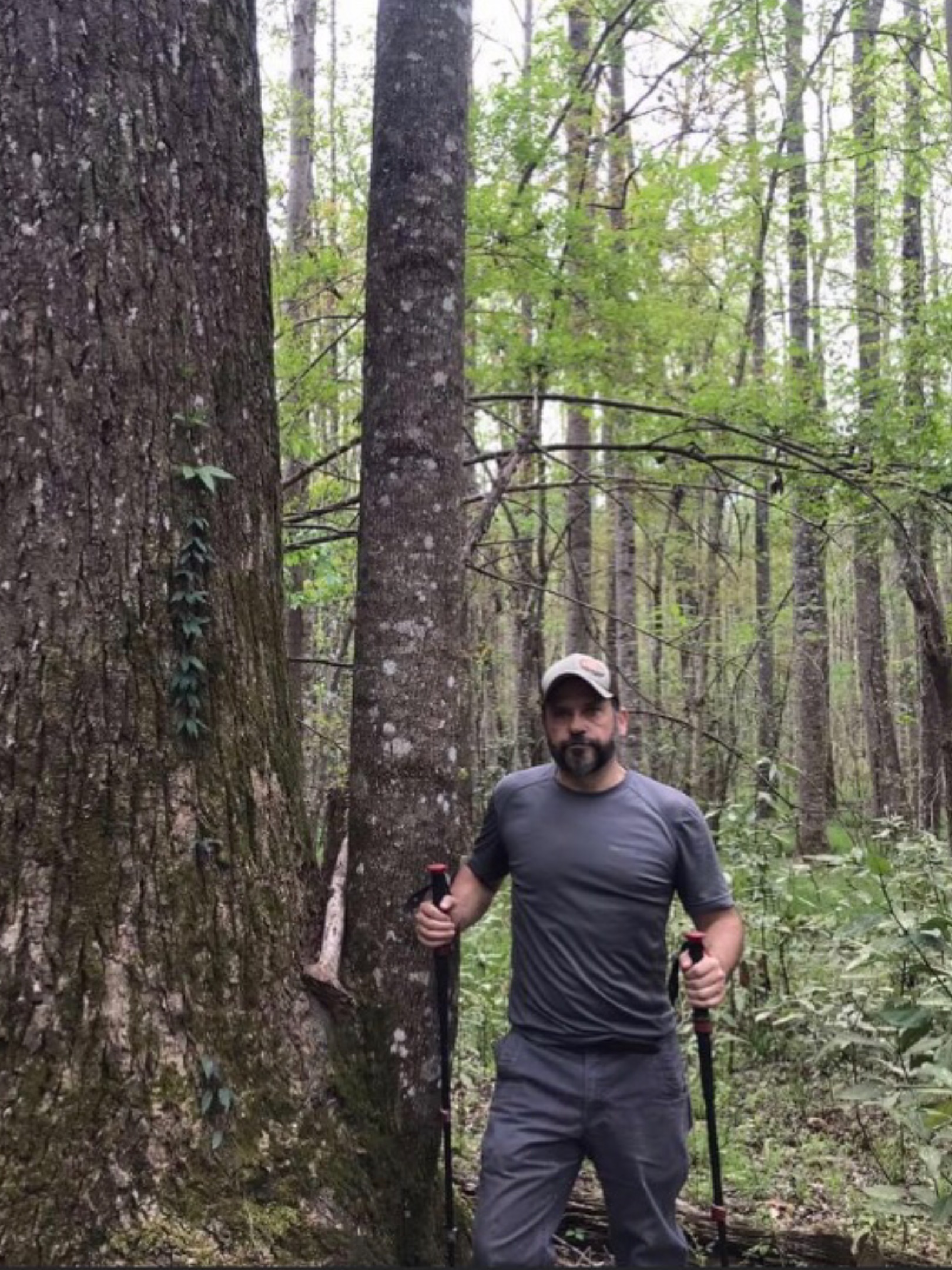
Dr. T. Robert Hart teaches Environmental History at University
of North Carolina Wilmington.
Robert "Dr. Rob" Condon
2021 Fainting Robin Distinguished Scholar
From the kindergarteners looking forward to their first day of
school, to the Ph.D candidates trying to complete their
dissertations, 2020 was a lost year for American students. After
discussions with the board, Fainting Robin Foundation decided to
give our 2021 Distinguished Scholar award to a teacher and scholar
who rose to the challenge of teaching during the COVID pandemic.
Today, in academia, there are scholars who devote their careers to
research, professors who devote their careers to teaching, and
bureaucrats who devote their careers to meetings and
administration. There are, however, very few academics who are
great scholars, teachers and administrators. Australian-American
marine biologist, Rob “Dr. Rob” Condon, is one of them.
Internationally renowned in his field, Condon’s research on global
jellyfish populations, the Deepwater Horizon oil spill, and
zooplankton in Sargasso Sea, has been published in numerous peer
reviewed journal articles and he has appeared on BBC and
CBS Sunday Morning, in Huffington Post,
The New York Times, MacLean Magazine, and
Wired. Irrespective of these professional accomplishments,
Condon walked away from a career in academia to establish the
Young Scientist Academy (YSA) in Wilmington, North Carolina, to
provide science, technology, engineering, and mathematics (STEM)
education for students from all racial and economic backgrounds.
“Science is a way of life and a powerful tool for solving
community problems,” wrote Condon, “Never has it been more clear
that we need to prepare the next generation with the tools and
confidence to address future challenges using science.”
After the COVID crisis hit and American teachers were forced to
pivot to online classes overnight, many low income students, who
lack access to high speed internet and reliable computers, were
left behind. By the end of the first grading period in Wilmington,
North Carolina’s New Hanover County school district (October
2020), 36% of middle school students and 29% percent of high
school students were failing at least one class. The numbers for
Black and Hispanic middle school and high school students failing
at least one class were much higher (44% and 41%).
In 2020, YSA shifted their focus to underserved and at-risk
minority populations. In addition to awarding over 100 full
scholarships to deserving students, YSA also created innovative
online programs that provided over 100 hours of free access to
virtual lessons, homework assignments, and online tutoring. Last
year alone, YSA mentored over 400 local youth in after-school and
home-school programs, provided vital outreach services like help
on homework, and summer programs. Despite the challenges of 2020,
YSA even added exciting new programs like Code Girls, an intensive
five-week program on computer coding and technology for girls.
They also launched Sidewalk Science, an afterschool hands-on
science class for kids held outside, under a tent in downtown
Wilmington’s Northside.
If nothing else, the COVID pandemic has exposed the limits of
technology-dependent online learning and served as a margin call
for a top-heavy American educational system. Given how short
traditional American education has fallen in recent years,
innovative educators like Rob Condon deserve support, and remind
us that teaching is an art and not a science.
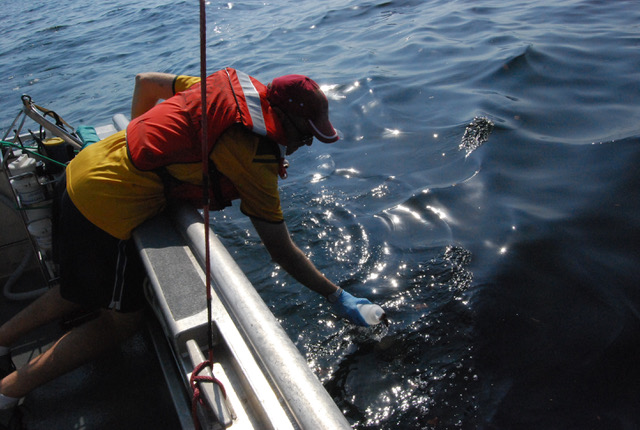
Oil Field Work

Rob works with youth in the Future Leaders program at StepUp
Wilmington on the importance of community gardens in urban
sustainability and healthy eating.
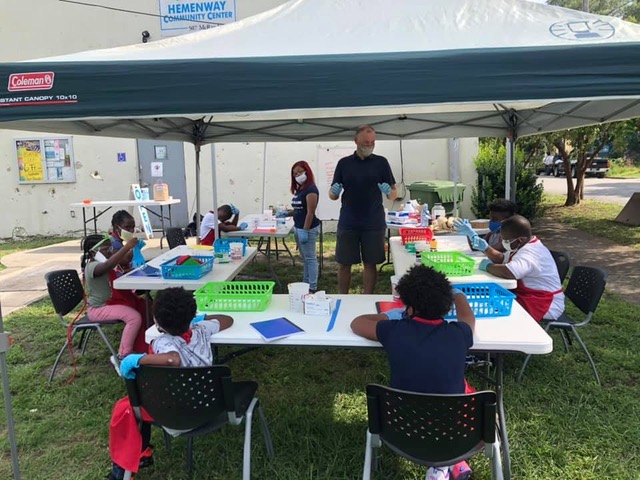
Rob teaches chemistry and physics to youth from the Voyage and
Maides Park communities as part of the Sidewalk Science
program in Wilmington's Northside.
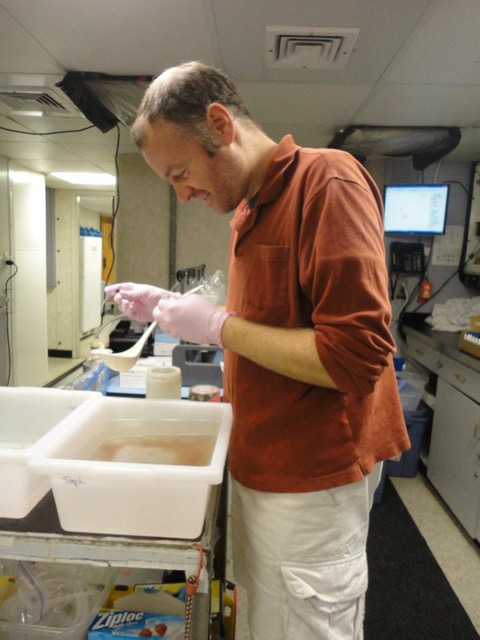
Rob sorting through a nighttime plankton sample collected on
the RV Atlantic Explorer research cruise examining marine food
webs in the Sargasso Sea.
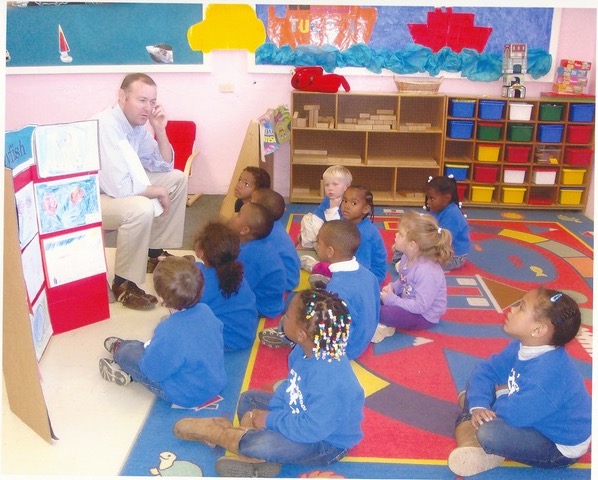
Rob talking with St. Georges Preschool children in Bermuda
about jellyfish and ocean animals. The jellyfish pictures were
entries submitted by the children as part of an International
Jellyfish Art Contest he conducted, in which over 500 children
from 26 different countries participated.
Agnes Fallah Kamara
2020 Fainting Robin Distinguished Scholar
Fainting Robin Foundation is proud to announce Agnes Fallah Kamara
as our 2020 Distinguished Scholar. Among other things, Kamara is
the author of the remarkable and heartfelt memoir
And Still Peace Did Not Come. In it, she describes the
psychological and emotional triage that comes in the wake of a
brutal civil war. Liberia’s two civil wars (1989-1997 and
1999-2003) left 300,000 dead and 75% of the country’s women
victims of rape. Although the Accra Comprehensive Peace Agreement
of 2003 brought about a ceasefire and a United Nations occupation,
it was little more than a power sharing agreement between the
warring factions that committed the atrocities. Like previous
civil wars in Cambodia and Rwanda, after Liberia’s wars ended,
victims and perpetrators often found themselves living side by
side. Many wondered if the nation could ever reintegrate the
thousands of child soldiers who carried out such unspeakable acts
against their fellow countrymen (rape, human sacrifice and
cannibalism).
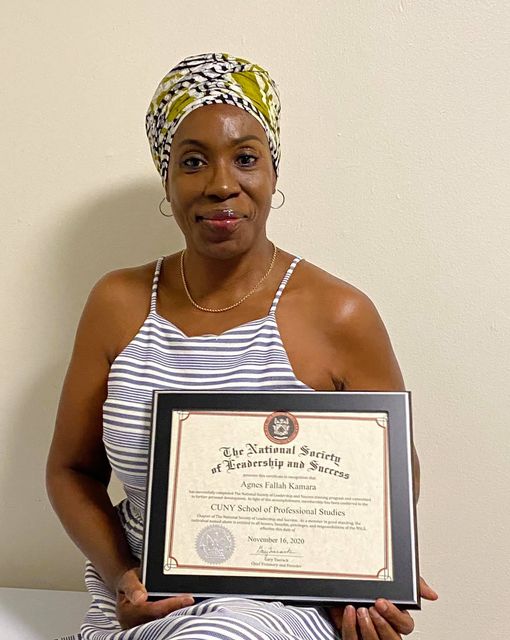
Agnes Fallah Kamara
Agnes Fallah Kamara fled Liberia in 1989, spent the next fourteen
years as a displaced person, and returned in 2004 to launch a
United Nation’s radio program called “Straight From The Heart.”
Amazingly, victims, child soldiers, war lords, and witnesses, all
voluntarily called in and shared their stories. After winning the
trust of both the victims and perpetrators, Fallah Kamara
established herself as one of Liberia’s postwar civic leaders.
“She specializes in persuading former child soldiers — men with
every reason to keep silent—to give oral histories, sometimes
confessing acts of bewildering violence on her radio program
there,” wrote The New York Times in a profile about her.
Fallah Kamara believes that getting over the past does not mean
forgetting it, but instead, acknowledging as a way to break the
cycle of vengeance. When Liberia’s Truth and Reconciliation
Commission fell short of expectations, Agnes Fallah Kamara
established the Straight From the Heart Center in Monrovia to
provide victims and perpetrators counseling, career guidance, and
workshops on everything from Ebola awareness to journalism.
On a 2014 Vital Voices Fellowship trip to South Africa, Jaki
Mathaga from Kenya told Fallah Kamara that her son had autism, “I
felt a lot of sympathy for my friend, but I was also eager to do
my best to support her and the autistic children in my country,
Liberia. By coincidence, during my studies in the United States,
my program offered a course on Autism Spectrum Disorder, which I
happily took to further enrich my knowledge about the disorder.”
When she returned to Liberia, it became clear to her that most
Liberians were ignorant about autism and that most of her
countrymen associated it with witchcraft, curses, spells, and
demons. Once again, Fallah Kamara took to the airways to debunk
misconceptions and explain autism’s actual causes. Her radio
program “Autism Conversation with Parents” aired once a week and
featured parents of autistic children as guests. They attempted to
educate people about how to manage autistic children and spot
early signs of the disorder. “Autism Conversation with Parents”
quickly gained the interest of families with autistic children,
many were relieved to learn that it had nothing to do with
witchcraft or curses. Next, Agnes Fallah Kamara began to meet with
some of these families and observe their children. “The meetings
with these families were some of the most heart-wrenching
experiences I have had in my life,” wrote Fallah Kamara, “Some
parents told me they had been insulted and kept at arm’s length by
other families, that their children were constantly mocked and not
allowed to play with other children, that they had suffered the
pain of managing an autistic child in a society with strong
cultural beliefs about the disorder.”
Agnes Fallah Kamara and her sister, Regina Fallah-Hausman, a
special needs teacher in New York, devised a plan for Liberia’s
first school for autistic children, which opened in the fall of
2018 in Monrovia. They are presently training more teachers,
social workers, and therapists in order to expand. Recently, they
launched a collaboration with A Friendly Face Academy, a New
York-based provider of therapy to autistic children. Her biggest
significant support to set up the first autistic classroom in
Liberia is from
Eden II & Genesis Foundation, in Staten Island, New York.
Today, many in the human rights world talk about reconciliation
after a civil war as if there is an accepted cross cultural
formula for “truth and reconciliation.” Not only is there no
precise formula, Fallah Kamara shows us that the process is often
more art than science. With great compassion and humility, Agnes
Fallah Kamara has helped to rebuild her society.
Update on Agnes Fallah Kamara:
After Fallah Kamara opened Liberia’s first school for autistic
children in 2018, she enrolled in a master’s program in disability
studies at the City University of New York. “Fainting Robin’s
award helped me to pay my tuition so I was able to study instead
of working two jobs to pay for my education,” she wrote, “I was
able to take 9 credits instead of 6 and maintained a 3.7 GPA.”
Because of Fallah Kamara’s strong track record as a civic leader
and high GPA, she was inducted into The National Society of
Leadership and Success in 2020. After Agnes Fallah Kamara receives
her degree in 2021, she will return to Liberia to work with
autistic children and their families.
Ed Vulliamy
2019 Fainting Robin Distinguished Scholar
It is a great pleasure to award Ed Vulliamy Fainting Robin
Foundation’s 2019 Distinguished Scholar Prize. The board selected
Vulliamy for his remarkable career as a frontline journalist.
While covering the Balkan wars for The Guardian, Ed was
awarded most of the major prizes in British journalism (Granada
Television’s Foreign Correspondent of the Year Award,
International Reporter of the Year, the Amnesty International
Media Award, the James Cameron Award, Foreign Reporter of the
Year).
Vulliamy was the first journalist since the Nuremberg trials to
testify at an international war crimes tribunal. He went on to
testify in ten Hague trials, including those of Bosnian Serb
leaders Dr. Radovan Karadzic and General Ratko Mladic. Vulliamy
covered the 9/11 attacks and their aftermath from his apartment in
lower Manhattan. He covered both Iraq wars and was among the first
to recognize the growing Iraqi insurgency. Since 2003, Ed has
worked along the U.S.-Mexican border, reporting on migration, drug
wars, cartels, and money laundering. His groundbreaking book
Amexica: War Along the Borderline won the 2013 Ryszard
Kapuscinski Award for Literary Reportage. After a horrific
accident that almost cost Ed his leg, he retired from
The Guardian and Observer newspapers in October 2016
and became a full-time freelancer. In 2018 Vulliamy published his
memoir, When Words Fail: A Life with Music, War and Peace.
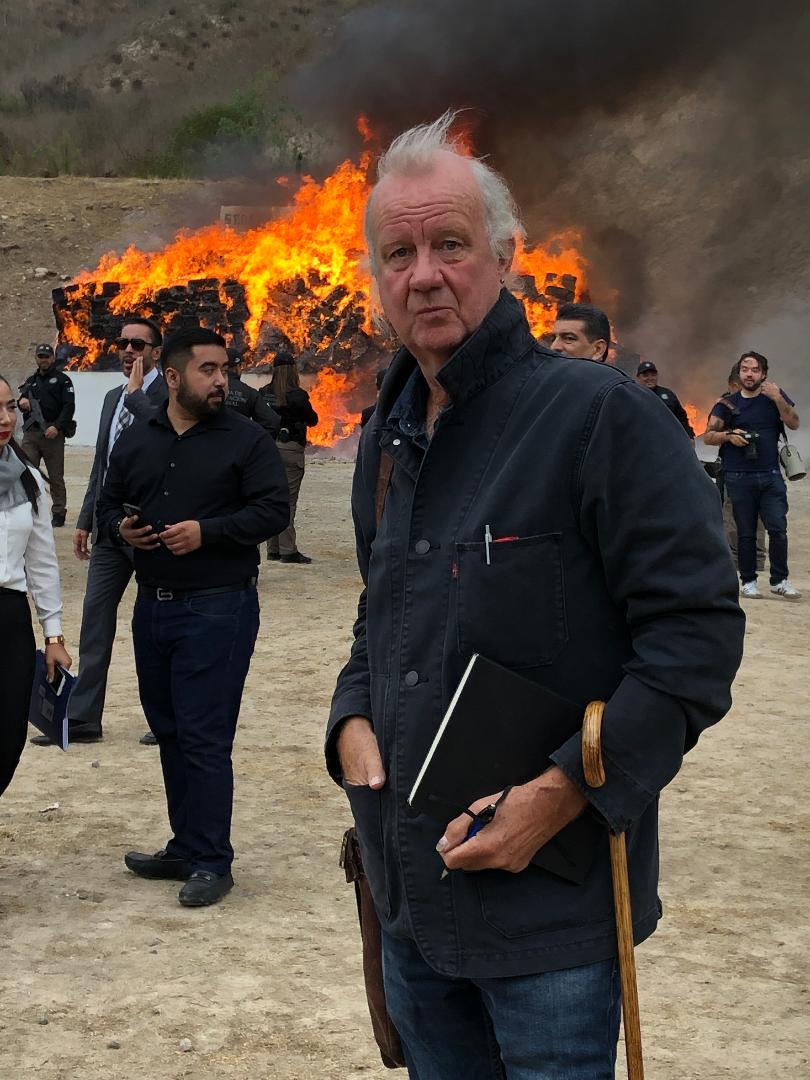
Ed Vulliamy with the Mexican government burning 26,000 tons of
heroin, cocaine, meth and other drugs in the background
Peter Maguire’s introduction of Ed Vulliamy at Bard College’s
"New Frontiers in Human Rights Law" conference October
15, 2011
"It is a pleasure to share the same stage that I did 11 years
ago with Ed Vulliamy at Bard College’s first accounting for
atrocities conference in 1998. At the time I asked the conference
participants to respond to a very difficult set of questions: Is
it possible to enforce the Nuremberg Principles and laws of war
without an unconditional surrender and monopoly on military power?
Will the U.S. ever be willing to observe legal standards that
inhibit America’s strategic options? If attacking civilian targets
is a war crime, what does one make of Hiroshima, Nagasaki, and
Tokyo? Finally, were the Nuremberg trials an anomaly in
international affairs rather than a new paradigm? The responses
from the participants were ground-breaking: South African judge
Richard Goldstone, Nuremberg expert Jon Bush, former Nuremberg
prosecutor William Caming, journalist Phillip Gourevich,
professional soldier Lt. Col Conrad Crane, Reverend Alex Borraine,
novelist Chinua Achebe, and Bard’s own Leon Botstein wrestled
earnestly and honestly with these difficult and complex questions.
However, there was one exception, one person refused to answer
these questions. To this human rights industry luminary, these
questions bordered on heresy. As far as he was concerned the
post-Cold-War world would be governed by an international criminal
court with "universal jurisdiction." At the time, many
of us who were actively involved in war crimes investigations in
the field and believed whole heartedly in war crimes
accountability were growing increasingly uncomfortable with the
evangelical tone that David Rieff would later describe as
"the international legal internationale."
At the 1998 conference, one man stood out from all the others. Not
only did he speak honestly and from his heart, he had been touched
by fire. Ed Vulliamy came fresh from former Yugoslavia where he
had discovered and exposed the Serb atrocities and concentration
camps. While the United Nation’s Sergio DeMillo was enabling the
Khmer Rouge during the UN’s occupation of Cambodia, Vulliamy was
the one truly chasing the flame. For his efforts, Ed was denounced
by some of his journalistic peers for testifying in the Hague and
even accused of fabricating the story by Noam Chomsky and his
acolytes.
My how the world has changed since the heady days of 1998. At that
time National Security Advisor Samantha Power was a cub reporter
writing open letters calling for a UN investigation of Senator
John Kerry’s actions during the Vietnam War, She and her Harvard
mentor Michael Ignatieff were the toast of the human rights world.
Then came 9/11 and everything changed. Overnight, everyone became
a tough guy or a tough girl—academics who had never been in a fist
fight much less a fire fight competed to see who could strike the
most macho pose against "Islamo-fascism." After 9/11
Michael Ignatieff endorsed torture and began to plot his run for
Canadian PM. Samantha Power’s doctrine of humanitarian
intervention was hijacked by the neocons and provided the
intellectual underpinnings for our ongoing Crusade in the
"Greater Middle East." Ed Vulliamy however, continued to
chase the flame at a great personal price and ran risks that few
outside of the Spec Ops community can imagine.
Above all, Ed Vulliamy has devoted his life to helping those who
were too powerless to help themselves. Just as we had previously
been viewed as heretics for pointing out uncomfortable truths
about the ICC and “universal jurisdiction,” after 9/11 we were
considered apostates for raising questions about the U.S. using
star chamber courts and evidence obtained by torture. During my
decade of field work in Cambodia, there was one person I
constantly turned to for advice both before and after especially
difficult trips—Ed Vulliamy. Like Sherman said of Grant after the
Civil War, "He stood by me when I was crazy and I stood by
him when he was drunk, and now we stand by each other
always." No flattering book review or polite applause from
the masters of the universe at the Council on Foreign Relations
can match the satisfaction that comes with the heartfelt thanks
and opprobrium we have both received from both the victims and
perpetrators of the atrocities we have investigated and exposed.
At the 1998 conference, Ed compared himself to the Coleridge’s
"Ancient Mariner" and added that he now sympathized with
the wedding guest. Ed said, "Poor sod, he just wanted to
enjoy himself and got pinned to the wall by this man." For
the next two days you, like Colerridge’s wedding guest, will be
pinned to the wall by Ancient Mariners like Ed Vulliamy, Khmer
Rouge survivor Sophal Ear, Professor Jonathan Bush, Col. Morris
Davis and myself. It is my great honor to introduce my colleague
and friend, Ed Vulliamy."
Update on Ed Vulliamy:
Vulliamy just completed an updated tenth anniversary edition of
the book that includes new material on recent events along the
U.S.-Mexican borderline: a humanitarian crisis of migration, the
shifting sands of cartel power, the rise of the Cartel Jalisco
Nueva Generación, and the fentanyl trade. The new book needed
extensive reporting from Mexico City, Veracruz, Sinaloa, the
dangerous frontier cities, in New York on the trial of Guzmán, and
deeper investigation of the laundering of his profits by the
Wachovia and HSBC banks. “The new edition had no publisher’s
advance,” wrote Vulliamy, “So that my independent scholar’s grant
from Fainting Robin provided an essential contribution to the
realization of the work. It was spent frugally but constructively
— every dollar accounted for – on travel and lodging along the
border during the years 2018-2020, in Tijuana, Ciudad Juárez,
Nuevo Laredo and Matamoros — all scenes of hyper-violent
contestation of the narco-trafficking plazas, and crises of
migration.” After his 2020 trip to Mexico, Vulliamy traveled to
Los Angeles and delivered a speech entitled, “From the Border to
the Bank: Migration and Misery, Drugs and Dollars” at the law firm
Munger, Tolls, and Olson.
Dr. Sylvain Vogel
2018 Fainting Robin Distinguished Scholar
"For more than twenty years, on his own time and at his own
expense, Sylvain Vogel has traveled to Cambodia’s most remote and
malarial forests to document the language, culture, and folklore
of Cambodia’s Bunong hilltribe," said FRF founder and
chairman Dr. Peter Maguire in his announcement of the award,
"Vogel is exactly the type of prolific, under supported, and
independent scholar that our foundation looks to help." FRF
will bring Vogel to Wilmington in 2017 where he and Maguire will
translate his latest work into English and interview some of the
Cambodian Bunong who have resettled here.
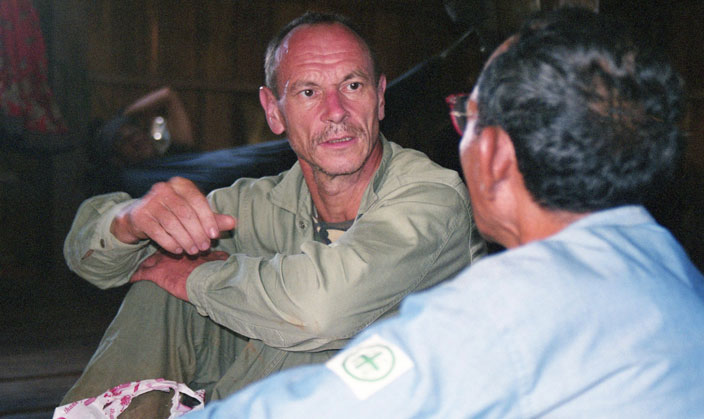
Dr. Sylvain Vogel
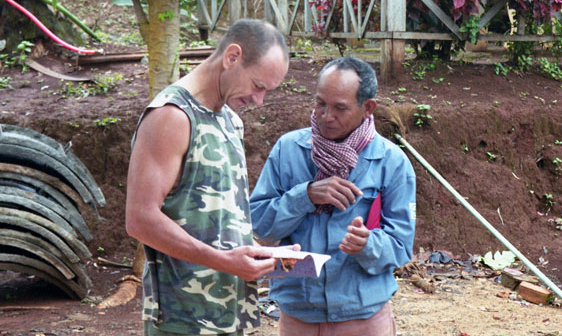
Vogel and his Bunong teacher and collaborator,
Nchööp.
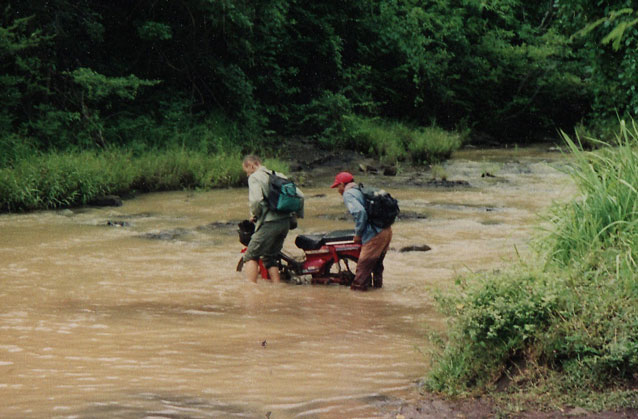
Vogel and Nchööp traveling to a Bunong village in
Mondulkiri.
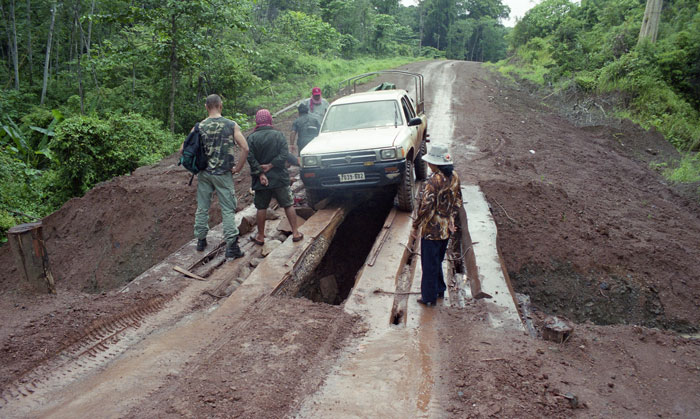
Crossing a bridge on the way to Mondulkiri.
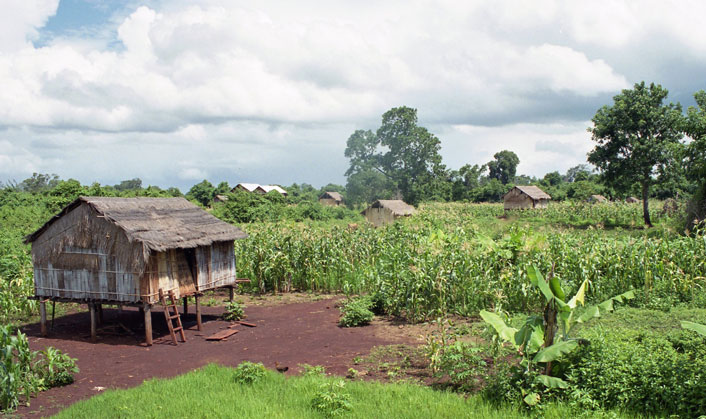
A Bunong village.
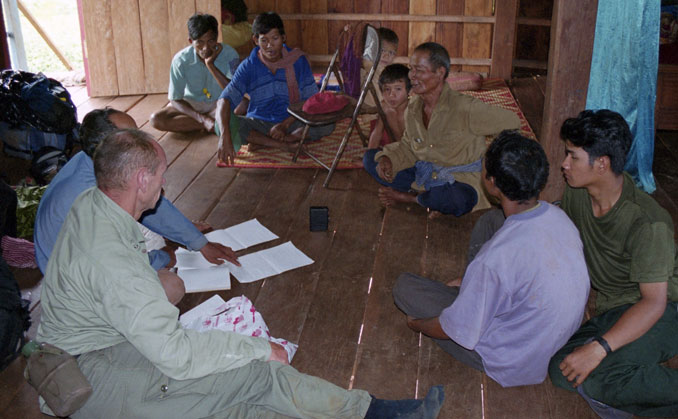
Vogel and Nchööp interviewing one of the last
surviving elephant tamers.
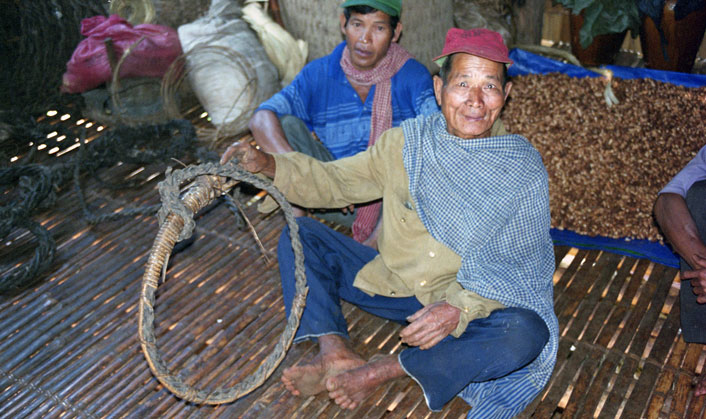
Bunong elephant tamer with his lasso.
Southeast Asia’s hill tribes (Montagnards) have been dying a slow,
agonizing death since their American allies withdrew from
Southeast Asia in 1975. Prior to the Vietnam War, one million
people inhabited the highlands of Vietnam, Cambodia and Laos where
the thirty-three tribes spoke their own languages, worshipped
their own Gods, and lived according to their own rules. Because
the surviving 30,000 Bunong remain largely unilingual, their
language is one of the last authentic examples of the old base of
Mon-Khmer languages.
This research is both important and time sensitive because hill
tribe languages and cultures are vanishing due to deforestation
and the encroachment of the exogenous populations of Cambodia and
Vietnam. Vogel’s discoveries about the phonetic and syntactic
features of Bunong have invalidated many linguistic theories and
helped to refine others. After studying their language and
immersing himself in their culture, Sylvain Vogel learned of a
vast body of unwritten literature that was passed down from
generation to generation. These philosophical stories of causation
explain everything from the mysterious construction of temples at
Angkor Wat to the Vietnam War. Vogel believes that the structure
of these aetiologic tales proves that the Bunong live self
sufficiently in the forest by choice, they "rejected the
coercion of the nation state or any other outside ruler." Not
only is this hill tribe conscious of having both a literature and
orature, their language has specific terms for each literary genre
(epic tale, mythical story, etc.). For many Western researchers
these genres are difficult to define. Vogel, however, has shown
that the defining criterion is the sound of the recitation in this
monosyllabic language: singing, repetition within a single stanza
(theme/rhyme) or grammatical structure (subject/predicate),
assonance, or a rupture marking a conclusion. The linguist
identified examples of phonetic reduction, the neutralization of
sequences, the use of deictic particles, and enunciation. Sylvain
Vogel’s two books and three journal articles on the Bunong have
clarified and resolved a number of linguistic debates.
As the Cambodian forest vanishes so does the hill tribe’s means of
sustaining their traditional way of life. The changing economics
of globalism, the imposition of the sovereign state system, and
ethics of the outside world have forced many to abandon their
traditional, egalitarian values and the freedom they once enjoyed
as independent farmers and hunters. "I was only a witness who
watched, with great sadness and a feeling of helplessness, the
disappearance of a culture,” said Vogel, “No wishful thinking, no
culturally sensitive language, no crying, or bleeding of hearts,
can change a thing."
"What Sylvain Vogel accomplished is astonishing, his latest
book, published by UNESCO, Voix du Mondolkiri historique,
is a tribute to the oral literature of the Bunong, which the
linguist compares to The Iliad. Given that Vogel is also a
master of ancient Greek, Latin and Sanskrit, he knows what he is
talking about"
—Professor Mathieu Guérin of the French National Institute
of Oriental Languages and Civilizations (INALCO)
"The story of Mr. Vogel is quite curious. A recognized
specialist of Persian and Pashto, he was ranked 1st in the Centre
national de la recherche scientifique (the largest governmental
research organization in France) entrance examination in 1992….He
learned Khmer, founded a department of linguistics where he taught
Khmer, and studied Phnong, to which he had already devoted three
books and two articles to the Asian Journal (2000 and 2007). The
reasons why no French scientific institute has chosen to recruit
this very brilliant and productive linguist would undoubtedly be
the subject of an interesting article in academic sociology"
—Professor Gérard Fussman Collège de France.
Biography
Sylvain Vogel received his undergraduate degree from Strasbourg
University in 1976 and spent most of 1977-1991 in Afghanistan and
Pakistan. The fieldwork he conducted in Baluchistan on the Wanetsi
dialect of Pashto became his dissertation, “Aspects of the Pashto
Verb.” After receiving his doctorate from the Sorbonne, Vogel
moved to Cambodia where he reestablished the linguistics
department at Phnom Penh University and began to document the
language, culture and folklore of the Cambodian hilltribes. Vogel
is the author of: "Conflits ethniques au Balouchistan
pakistanais : deux récits en wanetsi,"
Journal Asiatique, 1988; "Syntagme verbal et aspect en
Pashto," Bulletin de la Société de Linguistique, 1991;
"Oppositions aspectuelles et injonction en Pashto,"
Bulletin de la Société de Linguistique, 1994;
"Impératif, sémantique modale et personne en Pashto,"
Studia Iranica, 1989; "Pronoms et particules
énonciatives en phnong," Journal Asiatique, 2000;
"Classificateurs et quantifieurs en khmer moderne,"
BEFEO, 2002; "Noms en em- ploi syncatégorématique en
khmer et en francique,"
Bulletin de la Société de la linguistique de Paris, 2003;
Introduction à la grammaire de la langue et aux dits
traditionnels des Phnong de Mondulkiri, Editions Funan, 2006 (a 260-page book about the grammar and the
traditional poetry of the Cambodian province of Mondulkiri;
Chants phnong du Mondulkiri, Editions Funan, 2008.
Update on Sylvain Vogel:
After France’s oldest and most distinguished academic institution,
Académie des In-scriptions et Belles Lettres, awarded
Sylvain Vogel the Prix Santour for his time-sensitive field
research on the Cambodian Montagnard’s dying language and culture,
Vogel wrote, “Thanks to the generous grant Fainting Robin
Foundation awarded me, I was able to spend three months in the
highlands interviewing tribal elders to confirm my findings.” In
2020, Vogel broke new scholarly ground with his essay,
“Entre lexique et grammaire: intervalles de temps et
temporalization en buong, l’unite man ‘nuit’.”
In the article’s first footnote, Vogel wrote, “Finally, I am
pleased to express my deepest gratitude to the Fainting Robin
Foundation which largely funded this research and, in particular,
to its founder Peter Maguire for his generous hospitality when,
invited to North Carolina by him, he granted me hospitality within
his family for a month. Without them this article would never have
seen the light of day.” Entre lexique et grammaire will
appear in a book on minority languages that Peter Lang Publishing
Group will release in 2020.

